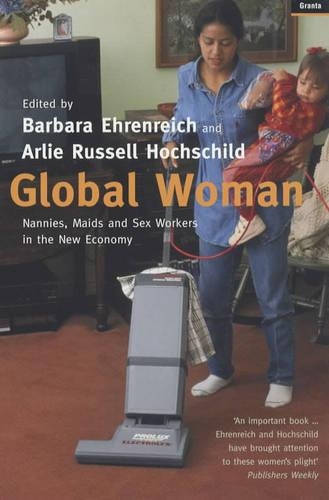
Global Woman: Nannies, Maids and Sex Workers in the New Economy
(Paperback)
Publishing Details
Global Woman: Nannies, Maids and Sex Workers in the New Economy
By (Author) Barbara Ehrenreich
Granta Books
Granta Books
1st September 2003
1st July 2003
United Kingdom
Classifications
Tertiary Education
Non Fiction
Gender studies: women and girls
305.43
Physical Properties
Paperback
288
Width 129mm, Height 198mm, Spine 21mm
235g
Description
Barbara Ehrenreich's bestselling Nickel and Dimed exposed the impossibility of living on the minimum wage in the USA. Now, with Arlie Russell Hochschild, she has widened her perspective to look at the effects global capitalism has been having on women's lives all over the world.
In a time shaped by mass migration and economic exchange, women are moving around the globe as never before. But for every female executive racking up frequent-flier miles, there are multitudes of women whose journeys go unnoticed. Every year, millions leave Mexico, Sri Lanka, the Philippines and Eastern Europe to work in the homes, nurseries and brothels of the First World. In the new global calculus, the female energy that flows to wealthy countries is subtracted from poor ones, often to the detriment of the families left behind. The migrant nanny - or cleaning woman, carer, maid - eases a 'care deficit' in rich countries, while her absence creates a 'care deficit' in her own country.
These fifteen vivid pieces confront a range of topics, from the fate of Vietnamese mail-order brides to Mexican nannies in LA, from Thai girls in Japanese brothels to Czech au pairs in the UK. Global Woman is an important and disturbing new book. It a reveals a new era in which the main resource now extracted from the Third World is no longer gold or silver, but love.
Reviews
This is an honest account of the ever-increasing trend for women from Eastern Europe, Sri Lanka, Mexico and other Third World countries to migrate to the First World. This quest for a better way of life is not often rewarded, as the grim truth of the matter is that most of these women become maids, sex-workers or even mail-order brides. Global Woman not only demonstrates the detrimental effects of globalisation on women, but also discusses the effects on the children taken overseas and on the families left behind. There are some shocking personal tales recounted - real-life Cinderella sagas but without the happy ending, some especially harrowing from a Western point of view. Ehrenreich and Hochschild argue that these women now represent the Third World's main resource for exportation.
Author Bio
Barbara Ehrenreich writes regularly for Time, Harper's, The New York Times Magazine and various British newspapers including The Times and the Guardian. She lives in Florida.
Arlie Hochschild is professor of sociology and co-director at the Centre for Working Families at the University of California, Berkeley. She is the author of The Managed Heart, The Second Shift, and The Time Bind.
